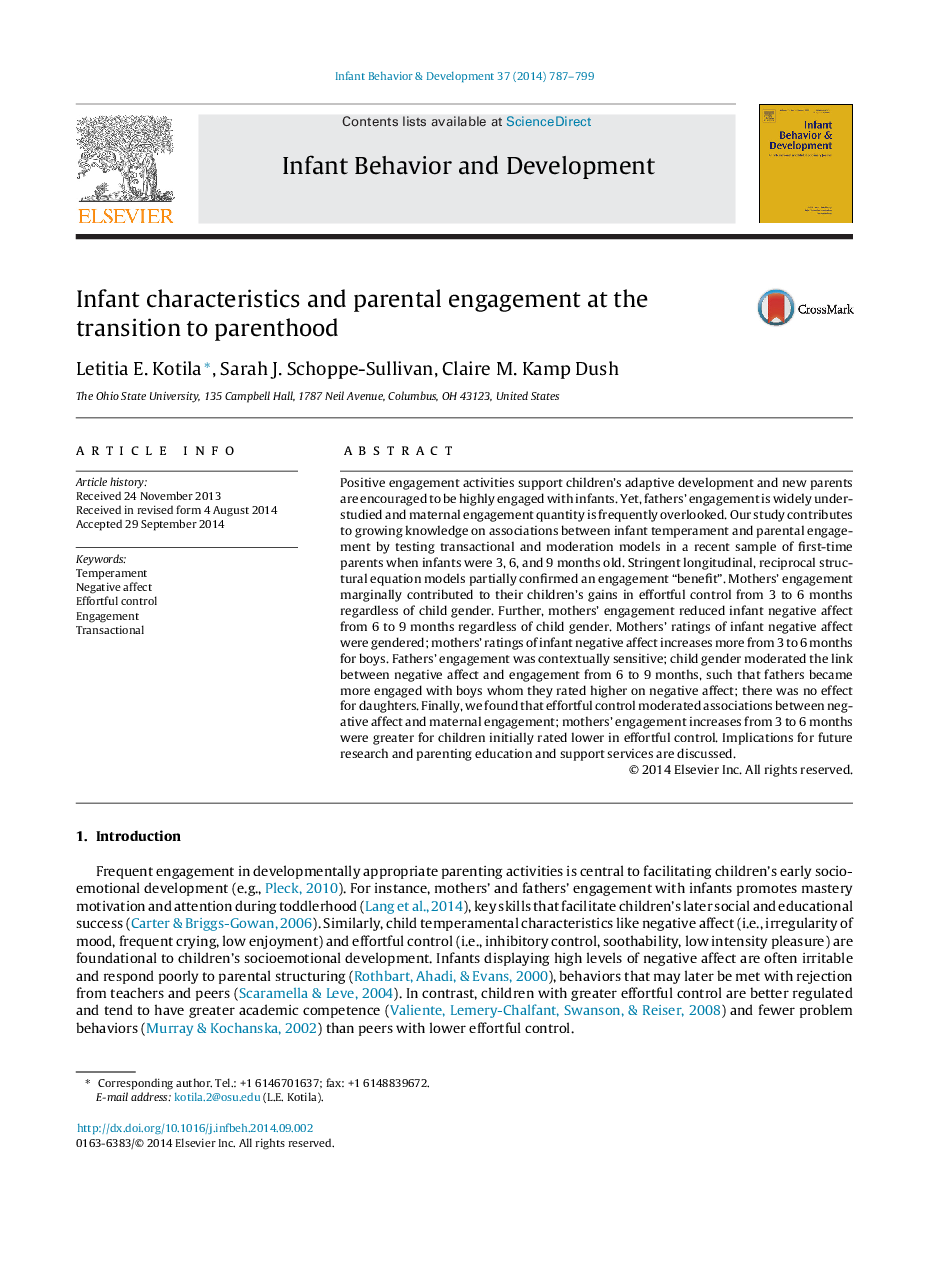| کد مقاله | کد نشریه | سال انتشار | مقاله انگلیسی | نسخه تمام متن |
|---|---|---|---|---|
| 10452645 | 919252 | 2014 | 13 صفحه PDF | دانلود رایگان |
عنوان انگلیسی مقاله ISI
Infant characteristics and parental engagement at the transition to parenthood
ترجمه فارسی عنوان
ویژگی های نوزاد و مشارکت والدین در انتقال به والدین
دانلود مقاله + سفارش ترجمه
دانلود مقاله ISI انگلیسی
رایگان برای ایرانیان
کلمات کلیدی
دماسنج، تأثیر منفی، کنترل زودرس، نامزدی، معامله
ترجمه چکیده
فعالیت های مشارکتی مثبت از انطباق پذیری کودکان حمایت می کند و والدین جدید تشویق می شوند تا با نوزادان بسیار درگیر شوند. با این حال، تعامل پدران به طور گسترده ای مورد بررسی قرار گرفته است و میزان مشارکت مادران اغلب نادیده گرفته می شود. مطالعه ما به افزایش دانش در مورد ارتباط بین خلق و خوی کودک و تعامل با والدین، با آزمایش مدل های معاملات و اعتدال در نمونه های اخیر پدر و مادر اول زمانی که نوزادان 3، 6 و 9 ماهه بود. مدلهای معادلات ساختاری طولی و متقابل، تقریبا یک تعهد را به اثبات رساندند. مشارکت مادران به طور معنی داری در دستیابی به مزایای فرزندان خود در کنترل شدید از 3 تا 6 ماه بدون در نظر گرفتن جنسیت فرزند، موجب شد. علاوه بر این، مشارکت مادران، تاثیرات منفی نوزادان را از 6 تا 9 ماه بدون در نظر گرفتن جنسیت کودک کاهش داد. رتبه بندی مادران تاثیر منفی نوزادان بر جنسیت است؛ رتبه بندی مادران تاثیر منفی نوزادان از 3 تا 6 ماه برای پسران افزایش می یابد. تعامل پدر با حساسیت محتوا بود؛ جنس کودک ارتباط بین تأثیر منفی و مشارکت را از 6 تا 9 ماه کنترل می کند، به طوری که پدران بیشتر درگیر پسرانی می شوند که بیشتر آنها را در اثر منفی قرار می دهند؛ هیچ تاثیری بر دختران نداشت. در نهایت، ما متوجه شدیم که کنترل شدید ارتباطات بین منفی و تعامل مادران را تعدیل می کند؛ مشارکت مادران از 3 تا 6 ماه افزایش می یابد برای کودکان که در ابتدا کمتر از کنترل شدید بودند، بیشتر بود. تأثیرات تحقیق و آموزش و خدمات پشتیبانی والدین مورد بحث قرار گرفته است.
موضوعات مرتبط
علوم زیستی و بیوفناوری
علم عصب شناسی
علوم اعصاب رفتاری
چکیده انگلیسی
Positive engagement activities support children's adaptive development and new parents are encouraged to be highly engaged with infants. Yet, fathers' engagement is widely understudied and maternal engagement quantity is frequently overlooked. Our study contributes to growing knowledge on associations between infant temperament and parental engagement by testing transactional and moderation models in a recent sample of first-time parents when infants were 3, 6, and 9 months old. Stringent longitudinal, reciprocal structural equation models partially confirmed an engagement “benefit”. Mothers' engagement marginally contributed to their children's gains in effortful control from 3 to 6 months regardless of child gender. Further, mothers' engagement reduced infant negative affect from 6 to 9 months regardless of child gender. Mothers' ratings of infant negative affect were gendered; mothers' ratings of infant negative affect increases more from 3 to 6 months for boys. Fathers' engagement was contextually sensitive; child gender moderated the link between negative affect and engagement from 6 to 9 months, such that fathers became more engaged with boys whom they rated higher on negative affect; there was no effect for daughters. Finally, we found that effortful control moderated associations between negative affect and maternal engagement; mothers' engagement increases from 3 to 6 months were greater for children initially rated lower in effortful control. Implications for future research and parenting education and support services are discussed.
ناشر
Database: Elsevier - ScienceDirect (ساینس دایرکت)
Journal: Infant Behavior and Development - Volume 37, Issue 4, November 2014, Pages 787-799
Journal: Infant Behavior and Development - Volume 37, Issue 4, November 2014, Pages 787-799
نویسندگان
Letitia E. Kotila, Sarah J. Schoppe-Sullivan, Claire M. Kamp Dush,
